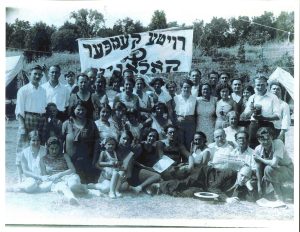IsraAID continues to support the Japanese rebuilding effort after the earthquake and tsunami that last year devastated the country’s northeast coast and claimed nearly 16,000 lives.
“We’re one of the only foreign NGOs still active and hands-on on the ground. Most other aid agencies have left. They’re still providing funding to local Japanese NGOs, but there are barely any western NGOs that are operating like us on the ground,” said Shachar Zahavi, the founder and director of IsraAID, an umbrella organization made up of Jewish and Israeli relief groups that provide aid worldwide.
Having returned to Israel from a trip to Japan earlier this month, Shachar said he was encouraged by the progress that has been made since the March 11 disaster.
IsraAID arrived in Japan within four days of the earthquake and tsunami to help clean up damaged homes and buildings, open child safety centres and distribute emergency aid to survivors and displaced people living in shelters.
Zahavi recalled that when the Israeli relief teams first arrived in Japan, the locals were reluctant to trust and accept help from foreigners.
“We learned that with them you really need to build trust,” Zahavi said, adding that once one community accepted them, others came around.
Looking beyond the clean-up effort, IsraAID has shifted its focus to helping the countless sufferers of post-traumatic stress disorder (PTSD), a condition brought on by the disaster.
Israeli therapists are stationed in cities, including Natori, Iwanuma, Watari, Yamamoto and Shinchi, to help survivors cope with PTSD and other anxiety issues.
“It’s amazing because we’ve been working in eight towns, and we’ve had more communities and NGOS and government officials asking us to expand our work into other areas,” he said.
“Just this week we got five national Japanese media outlets covering what we’re doing. They were amazed that we were still there.”
Not content to rest on his laurels, Zahavi said there are plans to expand even further and develop youth leadership programs.
“We’ll provide training to youth under 18 in the northern region and provide them with tools to make them social activists in the community and grant them access into the temporary shelters, which is something that is not common,” he said.
Zahavi added that as much as Japan is benefiting from Israeli expertise, the exposure on the world stage is also good for Israel’s image.
“It’s great for everyone – for them, for Israel, for the Jewish people.”
In other news, IsraAID partner organizations are working with the government in the newest African nation, South Sudan, to cope with the high incidence of gender-based violence.
Zahavi explained that since South Sudan declared its independence in July 2011, Israel immediately sought to establish diplomatic ties with the country.
Meanwhile, IsraAID sent a team to distribute relief items to the people living in the outskirts of Juba, the country’s capital, who were fleeing the violence in the northern part of the new state.
“There’s chaos now because of the war with the Sudanese. It’s still not a safe place. There is still chaos. They’ve got their country, but there’s conflict around the oil that is on the border between North and South Sudan. There’s violence,” Zahavi said.
Despite the instability in the region, IsraAID and its partner organizations such as FIRST (Fast Israeli Rescue & Search Team) and Operation Blessing Israel have moved into the “capacity-building phase” and are currently working with Confident Children Out of Conflict (CCC), a local NGO based in Juba, to facilitate a gender-based violence training program for 30 social workers in the South Sudan.
Rape and violence against Southern Sudanese women is fuelled by decades of conflict and war, as well as cultural practices that undermine women’s rights.
Polygamy, wife-beating, minors forced into marriage, abduction of girls and the culture of silence and stigma related to sexual violence is common.
Zahavi said that despite the fact that CCC staff are introduced to new rape cases each day, they simply aren’t trained and equipped to help the girls and women who seek support.
The IsraAID initiative began with a 10-day workshop led by three highly skilled and experienced Israeli therapists.
The workshop, which took place earlier this month, focused on practical skills necessary to support survivors of gender-based violence.
The local social workers were taught to hone their interviewing skills, and practise active listening and supportive engagement, self-regulation and stress-management techniques.
Zahavi said the ultimate goal is to educate the local community about the value of women in society.
“When the government heard what we’re doing, they asked us to provide a wider national training program on gender-based violence. They approached us,” Zahavi said.
“Our main idea now is to help the South Sudanese government… currently in gender-based violence, and later on with health issues and then agriculture production. We’re gradually trying to figure out their needs and we’re basing it upon their request.”
Zahavi credited UJA Federation of Greater Toronto, which partly funds the organization, for its support.
“UJA has, from the beginning, been supporting this. They supported us in the initial phase of the relief distribution when South Sudan first received their independence,” Zahavi said.
“They provided us with funding to distribute relief items in the camps in surrounding Juba. They’ve continued to support our efforts on a long-term basis.”
Zahavi said he hopes, with continued support, the initiative will foster lasting changes in the region.
“Hopefully over the next year, we’ll provide them with as much training as we can and eventually these groups will spread out throughout South Sudan in the smaller towns and build a system where they’re better able to deal with the whole gender issue.”






